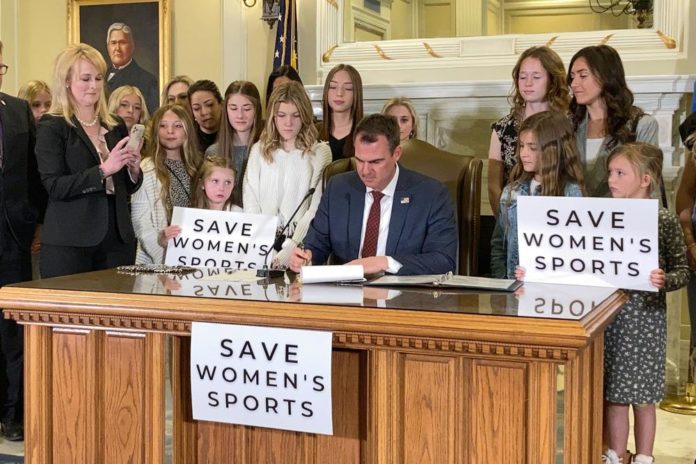
Oklahoma and Arizona governors Kevin Stitt and Doug Ducey both signed bills into law on Wednesday that prevent transgender girls and women from competing on female sports teams, joining more than a dozen other states with similar laws.
Flanked by more than two dozen young female athletes, including his 14-year-old daughter Piper, Oklahoma Gov. Kevin Stitt signed the measure, dubbed the “Save Women’s Sports Act.”
“This bill, the Save Women’s Sports Act, to us in Oklahoma is just common sense,” said Stitt, a first-term Republican who is running for reelection. “When it comes to sports and athletics, girls should compete against girls. Boys should compete against boys. And let’s be very clear: That’s all this bill says.”
Until two years ago, no state had passed a law regulating gender-designated youth sports. But the issue has become front and center in Republican-led statehouses since Idaho lawmakers passed the nation’s first sports participation law in 2020. That law is now blocked in court, along with another in West Virginia.
The Oklahoma bill, which took effect immediately with the governor’s signature, applies to female sports teams in both high school and college.
The new law was quickly panned by civil rights groups as unnecessarily targeting a group of people who already are marginalized.
“Transgender people belong everywhere, but with the swipe of a pen and a public display, Governor Stitt has sent a clear message to Oklahoma’s vulnerable transgender youth that they are not welcome or accepted in our state,” Tamya Cox-Toure, the executive director of the Oklahoma chapter of the American Civil Liberties Union. “Ultimately, SB2 violates the United States Constitution and federal civil rights law, puts Oklahoma at risk of losing federal funding, and harms transgender youth, all to solve a problem that does not exist.”
Oklahoma’s governing body for high school sports, the Oklahoma Secondary Schools Activity Association, has had a policy in place since 2015 addressing transgender athletes’ participation in sports, but OSSAA spokesman Van Shea Iven said no school has ever requested enforcement of the policy for a male student transitioning to female.
There are also few transgender athletes in Arizona schools. Since 2017, about 16 trans athletes have received waivers to play on teams that align with their gender identities out of about 170,000 high school athletes in the state, according to the Arizona Interscholastic Association.
Outside the room where Stitt signed the bill, 26-year-old Cara Klever, who is transgender, held a sign that read: “How does it feel bullying kids needing support?”
“They’re not going to keep trans kids from playing sports, having fun, or living their lives,” Klever said. “What they are going to do with this bill is tell them they’re not invited in spaces and amongst everyone else, that they’re not equal, that they’re not loved, that they’re not cared for.”
In Oklahoma, several supporters of the measure said they were convinced to vote for it after University of Pennsylvania swimmer Lia Thomas, a trans woman, won a title earlier this month at the national NCAA Women’s Division I championship.
Some opponents had raised concerns about the NCAA pulling sports tournaments from Oklahoma, including the Women’s College World Series, held each year in Oklahoma City, but Stitt said he wasn’t concerned.
“We’re not worried about it because we know Oklahomans are with us and the majority of Americans are with us as well,” he said.
Also, on Wednesday, Doug Ducey signed a measure outlawing abortion after 15 weeks if the U.S. Supreme Court allows it. The Arizona abortion legislation mirrors a Mississippi law now being considered by the nation’s high court. The bill explicitly says it does not overrule a state law in place for more than 100 years that would ban abortion outright if the Supreme Court overrules Roe v. Wade, the 1973 case that enshrined the right to abortion in law.













